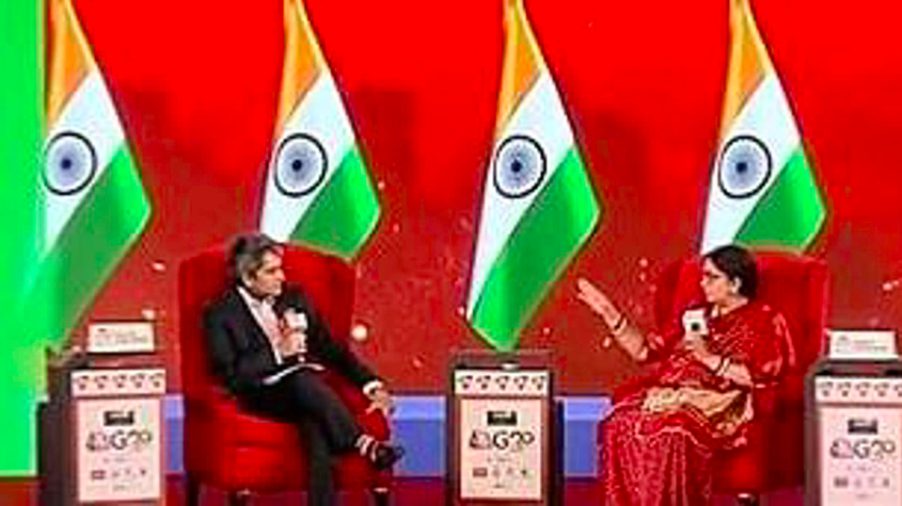Personal Brand Impact: Decoding Smriti Irani and Sudhir Chaudhary’s On-Air Debate
In the ever-evolving landscape of media and politics, clashes of words and ideologies are more than just events; they are moments that reflect the intersection of public discourse and personal image. A recent argument that developed on national television captured the nation’s attention, as Union Minister Smriti Irani engaged in a heated exchange with Sudhir Chaudhary, the prime-time news anchor and consulting editor of AAJ Tak. This fiery exchange, which revolved around the surging prices of tomatoes, highlighted the critical role that effective communication plays in shaping the image of public figures and the wider conversations they engage in.
The episode unfolded during a Saturday evening show, where Chaudhary posed a pointed question to Irani, sparking a conversation that resonated far beyond the confines of the television screen. Chaudhary’s question cut to the heart of the matter: “Was there a discussion in your home when tomatoes were selling at ₹250-300 per kg?” While the question was clearly about the escalating cost of tomatoes, it encapsulated a broader question about the government’s responsiveness to issues that have a direct impact on the everyday lives of citizens. In what followed, Irani’s response transformed the matter into a more personal zone, taking the spotlight away from the issue at hand and diverting it towards a personal incident from Chaudhary’s past.
#SudhirChaudhary has his own B&D moment… pic.twitter.com/mhCx5qS8x9
— The DeshBhakt ???????? (@TheDeshBhakt) August 19, 2023
With a touch of frustration evident in her voice, Irani replied, “I can also ask Sudhir Ji, what happened when you were in jail.” This reference took the conversation from tomatoes to an episode that Chaudhary was embroiled in during 2012. At that time, Sudhir Chaudhary, along with his colleague Sameer Ahluwalia, found themselves trapped in legal proceedings, accused of attempting to extort ₹100 crore from Congress MP Naveen Jindal’s group. The alleged motive behind the extortion was to withhold reports involving the Jindal Group in the coal scam. This event led to the duo’s 14-day judicial custody at Tihar Jail. Ultimately, the charges against them were resolved, but the incident left a mark on Chaudhary’s journalistic integrity and his role as the treasurer of the Broadcast Editors’ Association came under scrutiny.
The conflict offers a glimpse into the power of communication and its potential to shape personal brand, particularly for those in the public eye. Here are some crucial takeaways:
- Communication as a Catalyst: As public figures, politicians, and journalists possess the unique ability to drive conversations and influence opinions. Chaudhary’s seemingly harmless question about tomatoes was, in reality, an invitation for Irani to address a relevant concern affecting citizens. However, the conversation shifted off course due to the tone of the response.
- Calmness Amidst Storm: Chaudhary’s calm and composed conduct throughout the exchange highlighted his professionalism. Irani’s evident frustration, on the other hand, highlighted the importance of maintaining calm – particularly for politicians, as it demonstrates an ability to navigate high-pressure situations.
- The Pitfall of Whataboutery: In labelling Irani’s response as ‘whataboutery,’ Chaudhary drew attention to a common communication tactic that involves deflecting criticism by raising counterpoints. This strategy often diverts from the core issue and dilutes meaningful discourse.
- Addressing Concerns: Irani’s response missed an opportunity to address the initial question surrounding the rising tomato prices. For public figures, it is crucial to address concerns raised by journalists and citizens rather than engaging in personal confrontations.
- Maturity and Communication Skills: The exchange highlighted the significance of maturity and finely-honed communication skills. A well-considered and articulate response can resonate more deeply with the public than reactive outbursts.
- Impact on Personal Brand: The episode brought the personal brand of both Irani and Chaudhary into sharp focus. Irani’s response, which briefly delved into gender dynamics in the end, might have raised eyebrows. Personal branding, especially for public figures, requires careful cultivation and strategic management.
The intense exchange between Smriti Irani and Sudhir Chaudhary provides an informative lesson in communication for public figures. Chaudhary’s ability to sustain a balanced behaviour and remain focused on the central issue demonstrates professionalism. In contrast, Irani’s response has raised questions about her capacity to manage challenging questions with grace and poise. The exchange serves as a reminder that public figures’ words and actions are under constant scrutiny, and effective communication holds the power to significantly shape their public image and the broader discourse. As the media landscape continues to grow, these lessons in communication will remain suitable for all who engage in public discussions that influence perceptions and narratives.
Based on what I understand about personal brands, it’s pretty clear that Smriti Irani should work on enhancing her communication skills. This includes staying calm and choosing the right words. It’s not just about what you say, but also how you say it. The recent TV discussion and debate have hurt her personal brand, and this isn’t good for people who are known by the public.
On the other hand, Sudhir Chaudhary’s personal brand seems to have stayed positive. He remained calm and professional throughout the conversation. He acted like a strong journalist who didn’t stop asking important questions. Even if we don’t consider what people think about Sudhir Chaudhary, he showed professionalism and seemed ready to handle any personal comments. It’s important to remember that Chaudhary doesn’t need votes from people like politicians do. This makes his composure even more noteworthy.
In the world of personal branding, this incident teaches us that both what you say and how you say it matter. Smriti Irani’s situation reminds us that public figures are always being watched, and how they communicate can greatly affect how people see them. This is especially true in a time when communication happens through various channels. Good communication skills are essential for those in the public eye as they navigate the complex world of public opinions and perceptions.

